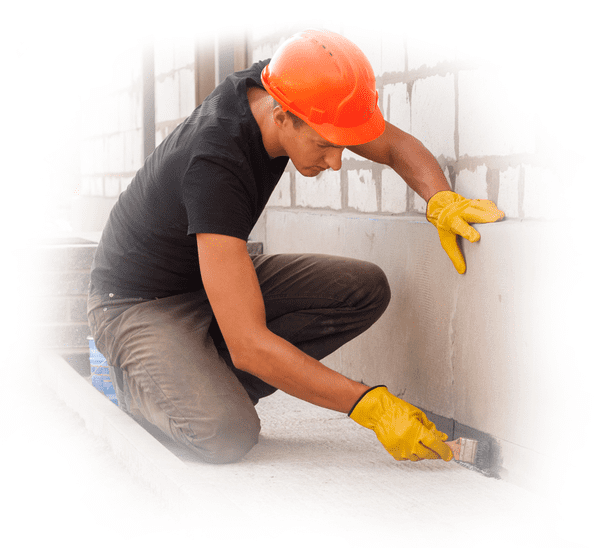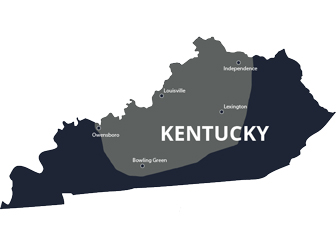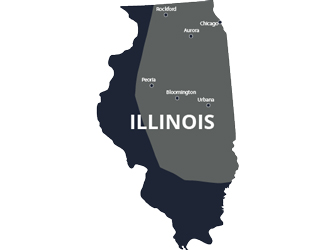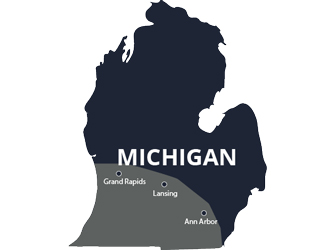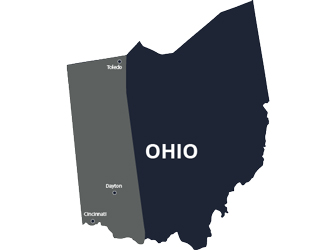Originally posted 4/12/19, updated 8/30/21
The Oxford English dictionary defines a “foundation” as the lowest load-bearing part of a building. Every home has one; it’s the base of the structure and it’s a critical component for your home’s stability.
Acculevel specializes in foundation repair and waterproofing. We’re a family-owned and operated company that’s been restoring homes to full strength and stability since our start in 1996. So far, we’ve helped more than 30,000 homeowners preserve and protect their greatest investment.
In this article, we’re going to review the most popular materials used to build a foundation and the three primary types you’ll find throughout the Midwest (Indiana and the surrounding areas).
What Are House Foundations Made of?
Before the 1950’s, home foundations were made of either stone or brick. As you might expect, homeowners had a tendency to use whichever material was most prevalent. In rocky areas, people often used the stones they excavated as they leveled land or excavated a root cellar. (A root cellar is a room dug below ground that was used for food storage before refrigeration). In areas with more clay, bricks were cheaper and easier to get.
After WWII, there was a major home building boom and that’s when concrete became the more dominant foundation material. Concrete blocks were the norm until the 1980s, when construction companies began using poured concrete for residential homes.
What Are the Major Factors in Determining Foundation Type?
When considering a foundation type, the builder must take a number of factors into account. Many times, one builder will develop an entire subdivision, and offer only one kind of foundation. This is done after they’ve considered things like soil type, the depth of the water table, weather norms, likelihood of flooding, etc. Of course, the homeowners’ preferences are considered, but in some areas a full basement is just not feasible.
What Are the Three Major Foundation Types?
Slab Foundation
A concrete slab foundation is the least expensive and fastest to install. It’s a large slab of concrete that is poured directly onto a gravel bed laid over tamped and leveled soil. Your home is built directly on top of it; there is no space underneath it. Any plumbing or heating/cooling pipes are buried in the ground underneath the slab.
A slab foundation may mean cost savings, but it also has the disadvantage of being next to the soil. Your utilities are not readily accessible for repairs. There is no space available for water drainage inside the home, so you’re at a disadvantage if moisture issues develop. A slab foundation also does not provide any protection for you, in the event of tornadoes or major storms.
Crawl Space
A crawl space is a mixed bag, in terms of foundations. Unlike a slab foundation, a crawl space typically provides approximately three feet of space between the ground and your home. It doesn’t have a floor of any kind; the “floor” is the ground below your home. But it has short walls built up from the ground, which is what creates the space below your home.
This open space is where your builder can install your HVAC, pipes, and other utilities This then allows for maintenance to be performed as needed, without major inconvenience or disruption. If water intrusion becomes an issue, a crawl space also provides room for water drainage installation. A crawl space can even be used for storage, if you have it encapsulated.
However, a crawl space is also more susceptible to moisture problems because of the exposed earth. Over time, moisture often leads to biological growth and/or sagging floor problems. Crawl spaces do not provide protection from severe weather. Even if the access point is inside the home, most people find them too cramped or dirty for use.
Basement
Basements are the most expensive to build, but are the most useful type of foundation. They require excavation, 9-10 feet below grade. A concrete floor is poured, then walls are either built (in block) or poured.
Like a crawl space, a basement is where the builder is going to place your HVAC unit, water heater, and other utilities. The rest of the basement is usually left unfinished (bare concrete) during the original build. Homeowners often decide to turn one or more rooms into liveable space later. Regardless of finishes, a basement functions as a safe location for your family in the event of a tornado.
Because a basement is below ground, hydrostatic pressure or water intrusion can become an issue. We strongly encourage homeowners to waterproof (or encapsulate!) their basement before adding finishes like drywall or carpet. If this isn’t done, you run the risk of having to remove damaged materials if water seeps into the basement.
Which Foundation is Best for You?
There is no one right answer to this question; it depends entirely on what you want in a home. All of them come with certain risks, because natural forces like weather and water cause problems for all homeowners.
Additional Resources
If you are currently house hunting, we have a Homebuyers Foundation Guide, which discusses potential signs of trouble.
In love with a house that has already needed foundation repair? We also have an article that will help you debate the pros and cons of previously repaired homes.
Not sure if you have a crawl space? This video explains how to locate the entrance, if the previous homeowner failed to provide that information:
Need Help Diagnosing Potential Problems in Your Foundation?
Have you seen some worrying signs in your own home? Not sure what the cracks in your drywall mean? Maybe you need more information about water intrusion or biological growth? Use our free interactive Symptom Checker to evaluate your concerns:














